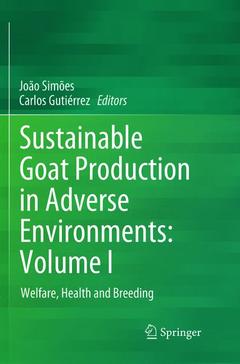Sustainable Goat Production in Adverse Environments: Volume I, Softcover reprint of the original 1st ed. 2017 Welfare, Health and Breeding
Coordonnateurs : Simões João, Gutiérrez Carlos

This book explores the current trends and challenges of sustainable goat meat and milk production in different global contexts, providing valuable insights into this industry in adverse environments like mountain, semiarid and arid regions. It also includes contributions from international experts discussing goat reproduction, genetic diversity and improvement, as well topics such as animal health, welfare, socioeconomic aspects, and many other issues regarding the environmentally friendly and economically viable exploitation of goats.
This is a highly informative book providing scientific insight for readers with an interest in sustainable agriculture and socio-economic aspects, as well as goat breed conservation, genetic diversity, and veterinary care. These subjects are complemented in a second volume providing a detailed description of more than 40 indigenous goat breeds and several ecotypes found in Asia, Africa, Europe, and America.
João Simões
Born in 1967 in Portugal and son of small farmers, João Simões soon developed an affinity for agriculture and livestock that was to shape his professional life and career. From 1993, as a DVM he mainly worked in large-animal clinics. Simultaneously, he joined the Portuguese academy as a professor at the School of Veterinary Sciences, University of Trás-os-Montes e Alto Douro. His academic research is focused on goat reproduction, and he obtained his PhD degree in Veterinary Science on the subject in 2004. He has written numerous scientific and technical publications in collaboration with veterinary students, producers and national agricultural associations. He lives with his wife and two small children in the mountain region of northeast Portugal.
Carlos Gutiérrez
Carlos Gutiérrez received the DVM in 1986, Diploma in Public Health in 1988, PhD in 1995, M.Sc. in 2003, and Diplom ECSRHM in 2013. Currently, he is a professor atthe School of Veterinary Sciences, University of Las Palmas de Gran Canaria, Spain, and Head of the Large Animal Unit, Teaching Veterinary Hospital. He is particularly interested in tropical animal diseases (trypanosomosis in particular), zoonosis and metabolic diseases affecting dairy goats.
Date de parution : 06-2019
Ouvrage de 539 p.
15.5x23.5 cm
Date de parution : 01-2018
Ouvrage de 539 p.
15.5x23.5 cm



